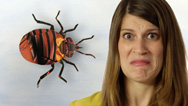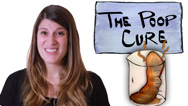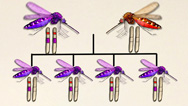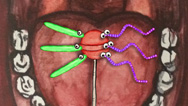Three Facts About Periods
- By Anna Rothschild
- Posted 02.11.16
- NOVA
Knowing more about periods is important for everyone’s health, not just people with a uterus. In this special “not gross” episode of Gross Science, host Anna Rothschild answers three surprising questions about menstruation that you may have been too afraid to ask.
Transcript
Three Facts About Periods
Posted: February 18, 2016
Lots of our bodily functions seem gross, and that makes them hard to talk about. Especially periods. They combine bodily fluids and sex, two topics that make some people a little squeamish. But they’re a totally normal part of life and are experienced by about half the population.
Understanding our bodies means not being afraid to ask questions, so seeing as this week is Valentine’s Day, what better way to celebrate than by answering three surprising questions about periods, in honor of the tens of millions of women who’ll have theirs that day. And men, there’s even stuff in here for you, too!
I’m so romantic
I’m Anna Rothschild and this is… NOT SO Gross Science.
Ok, let’s get started.
Question 1. What’s actually in period blood?
Well, it’s made up of cells from the lining of the uterus, immune cells, vaginal secretions, and of course, blood. And one small study in which doctors collected participants blood from their used tampons found that it contains 385 unique proteins that aren’t found in either vaginal secretions or in the blood circulating in your body. The cool thing is that if we can figure out what’s in average menstrual blood, one day doctors could possibly use it to diagnose different diseases, or figure out why a woman might have trouble getting pregnant.
It turns out that by studying periods, we could even learn how to keep other parts of our body healthy.The uterus has to withstand inflammation really well, and despite all the shedding and rebuilding of the lining, it doesn’t get scarred, even after many cycles. So as scientists figure out how the uterus stays so resilient they could maybe figure out how to heal other parts of our bodies, too.
Ok, let’s move on to Question 2, which is about going number 2! Why do I always have to poop so much when I have my period?
Lots of women experience this phenomenon and for that you can probably thank two chemical signals: prostaglandins and progesterone. Prostaglandins signal the uterus to contract, to push out the uterine lining. But it’s likely that some nonconformist prostaglandins head over to the bowels and make them contract too, with some stinky results. Also, progesterone, which is a hormone that helps you maintain a pregnancy, is slightly constipating. But levels of it drop during your period, so it lets things loosen up down there.
Finally, Question 3. Are humans the only animals that menstruate?
The answer is no, but there aren’t many others. As far as we know, menstruation only happens in some primates, some bats, and weirdly, elephant shrews. That said, some animals, like dogs, may bleed at other times, like when they’re about to reach peak fertility.
Now, from what we understand, primates, bats and elephant shrews all evolved to have periods independently. So what do they have in common? Well, they all build up their endometrial lining before they get pregnant. And this is different from most other mammals, which build up the lining only after they get pregnant. So, why did we evolve that way? Well, one idea is that humans have super invasive embryos, which burrow far down into the uterus to interact with the mom’s blood vessels. The embryos of many other animals really only graze the surface. So, it’s possible that building up the lining before getting pregnant actually evolved as a way to protect the mother’s uterus, kinda providing a cushion for the embryo to burrow into. In other words, it may have kept the embryo from damaging the uterus, which could have prevented the mother from ever getting pregnant again in the future. Of course, that cushion also provides a comfy environment for the hungry embryo to grow in.
On top of that, the lining might also help recognize fetuses with problems, and signal the body to abort early on if it detects abnormalities. If there’s something wrong with the embryo, or the woman doesn’t get pregnant at all, she’ll shed the lining and start the process over.
Alright, those were my three questions. But before I go, I wanted to fill you guys in on a conversation I had while I was researching this story. I spoke to Dr. Kathryn Clancy, an anthropologist who studies female reproduction. She told me that some basic studies on healthy, menstruating women still haven’t been done—likely ‘cause there weren’t enough scientists around asking questions about it. As she said, “This is one of those reasons that diversity in science is very important.” It seems like that’s starting to change now, but we need to keep up the conversation, and encourage more research on the subject. ‘Cause knowing more about periods could be helpful for all of us.
Credits
PRODUCTION CREDITS
- Host, Writer, Editor, Animator
- Anna Rothschild
- Additional Research and Writing
- Karishma Desai
- Many thanks to Dr. Kathryn Clancy, Dr. Deena Emera, the entire PBS Digital Studios team for the awesome brainstorming session, Seeta Joseph, Allison Eck, Greg Kestin, and Jeffrey Wood.
- Bad
- Music Provided by APM
- Original Footage and Animations
- ©WGBH Educational Foundation 2016
FOOTAGE AND IMAGES
- Lady Parts Cross Stitches
-
Courtesy WhittyB
To purchase the patterns, visit her Etsy shop: http://etsy.me/1K81Klb - Female Scientist Examining Erlenmeyer Flask With Red Liquid Hd
- Pond5/motion_poland
- Color SEM of uterus endometrium (secretory phase)
- Professor P.M. Motta & E. Vizza / Science Photo Library
- Phylogeny
- Courtesy Dr. Deena Emera
- File:Schimpanse Zoo Leipsig
- Wikimedia Commons/Thomas Lersch
- File:Pallas’s long-tongued bat
- Atsme (Betty Wills)
- File:Eastern Rock Elephant Shrew
- Wikimedia Commons/Marktittley
- File:Do i look funny or something
- Wikimedia Commons/Emily Killian Molina from austin, United States
SFX
- Cockroaches
-
Freesound/StateAardvark
(used with permission from author) - Squeak Pack/squeak_10
- Freesound/Corsica_S
- Pencil_check_mark_2
- Freesound/jakobhandersen
- Short Fart_01
- Freesound/DSISStudios
- Produced by WGBH for PBS Digital Studios
Sources
Want more info?
Paper on proteins in periods:
http://1.usa.gov/1QrzJ4L
LiveScience on why menstruation remains a medical
mystery:
http://bit.ly/1PD17x0
Francie Diep writing for PopSci on why you poop more when
you have your period:
http://bit.ly/20oMYIC
Regarding the section on how menstruation evolved, as I indicated in the video, this is one hypothesis. Here’s more info on it, along with other ideas:
Paper on the hypothesis I discuss about why menstruation
evolved:
http://bit.ly/1msFqaw
Pharyngula on the mother-fetus conflict hypothesis of how
menstruation evolved:
http://bit.ly/1PNJvC2
Paper on energy economy in the evolution of menstruation:
http://bit.ly/1QVOXlb
BBC article that addresses multiple hypotheses for the
evolution of menstruation:
http://bbc.in/1KFFE9B
Also, a note: In this piece, when I say menstruation, I’m referring to “overt menstruation,” where the lining is shed and then expelled from the body. Some people use the term “covert menstruation” to talk about animals that have “estrous cycles” and reabsorb their endometrium.
Related Links
-

Gross Science
Bizarre stories from the slimy, smelly, creepy world of science.
-

The Poop Cure
Fecal transplants are surprisingly effective cures for a dangerous bacterial infection.
-

No More Mosquitoes?
A new technology could make diseases like Zika a thing of the past. But should we use it?
-

What Really Causes Cavities?
Hate going to the dentist? Keep the millions of microbes in your mouth happy.

